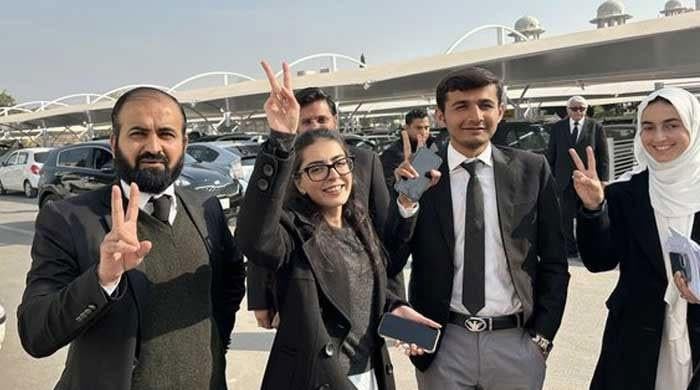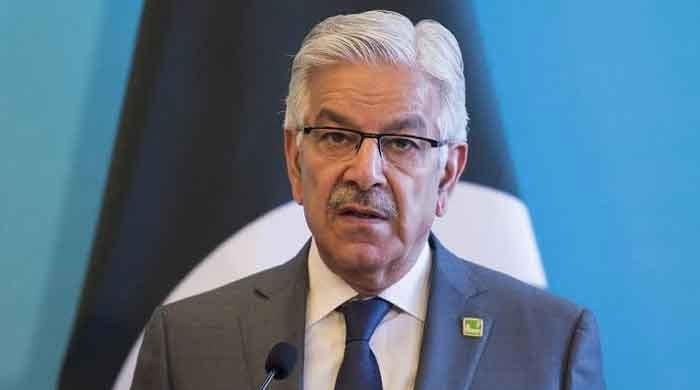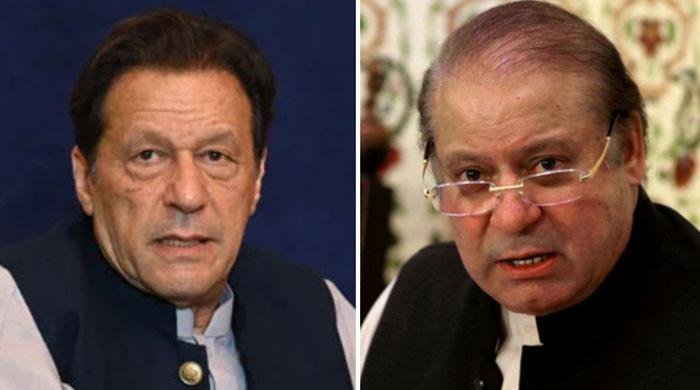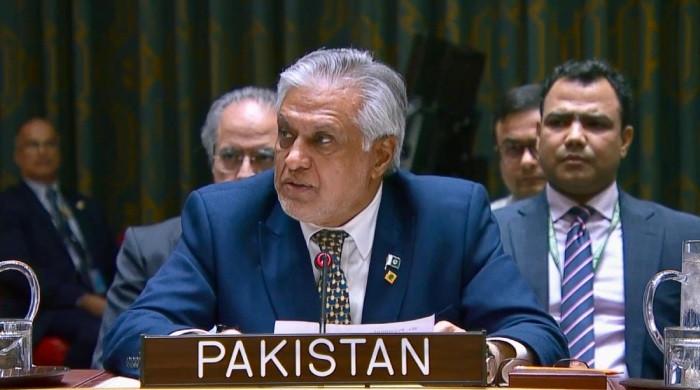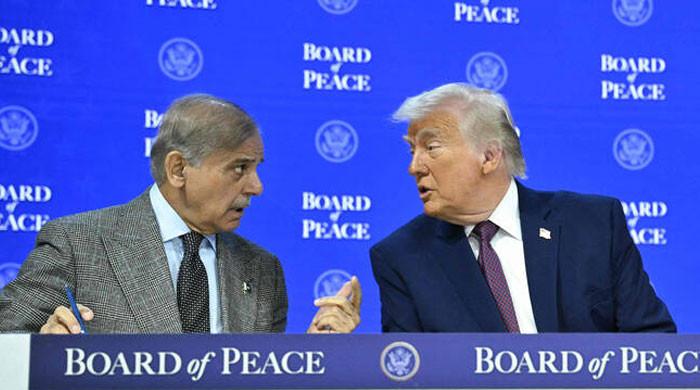Even if speaker cites Article 5, no-confidence motion cannot be rejected: CJP
CJP restricts state institutions from taking any extra-constitutional steps; hearing adjourned till tomorrow
April 04, 2022
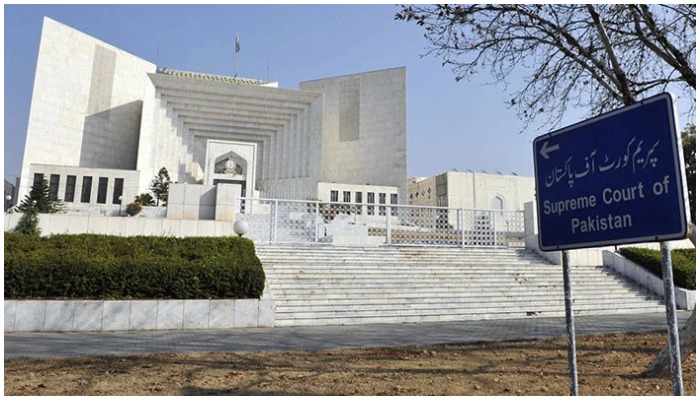
- Five-member larger bench to hear suo-motu notice and presidential reference.
- CJP restricts state institutions from taking any extra-constitutional steps.
- Issues notices to political parties to become respondents in case while staying peaceful.
ISLAMABAD: Chief Justice of Pakistan Justice Umar Ata Bandial on Monday said that even if the speaker of the National Assembly cites Article 5 of the Constitution, the no-confidence motion cannot be rejected.
A five-member larger bench of the apex court, headed by Justice Bandial and comprising Justice Muneeb Akhtar, Justice Aijazul Ahsan, Justice Mazhar Alam, and Justice Jamal Khan Mandokhel resumed hearing on the case filed by the joint Opposition a day earlier when the deputy speaker of the National Assembly barred parliamentarians from voting on the no-trust motion against Prime Minister Imran Khan, terming it "unconstitutional." As a result, the CJP had taken a suo motu notice of the situation.
PTI's lawyer Babar Awan, in his arguments, said that he wanted to refer to the decision of the Supreme Court dated March 21, 2022. "The Attorney General had assured the court that no member of the Assembly would be prevented from appearing there. The Supreme Court did not take notice of the PTI's allies in this regard.
Babar Awan said that the presidential reference should be heard with the present suo motu notice.
"Record my request, Imran Khan has allowed me to say this before the court that we are ready to hold elections."
Upon hearing that, Justice Bandial told him "not to talk about politics in front of the judges."
Justice Bandial maintained in a written judgment that his fellow judges had approached him and had expressed concern over the constitutional crisis the country was facing.
During the hearing, PPP's counsel Farooq H Naek referred to Article 54(3) and said that the National Assembly session was supposed to be convened within 14 days after a motion is submitted.
"The no-trust motion was submitted on March 8, 2022, while the assembly session was called on March 25 instead of March 21. The NA deputy speaker adjourned session on March 25 after Fateha till March 28," Naek said.
The speaker didn't provide any reason for not convening the meeting till March 20 after the motion was submitted, he added.
At this, Justice Mandokhel objected that Naek's case is related to the action of the speaker in Sunday's NA session.
"Tell [me] if the speaker was right or wrong," the judge asked Naek.
"If there are 100 members in the assembly, and of them, 50 are against it and only 25 support it. Wouldn't the motion be dismissed if the majority is opposing it?" Justice Akhtar questioned.
Naek said that if the majority says that the motion cannot be presented, then it cannot happen. He, however, added that it is the House that allows the motion to be presented, not the speaker.
Justice Akhtar replied that if the government is in the majority in the NA, and if it votes against the motion, no motion will ever be moved.
"Does the speaker have the power not to allow the motion to be moved? What happens if the speaker does not allow motion?" he asked.
'No-trust move invalid till leave is granted'
Meanwhile, Justice Ahsan remarked that the "no-confidence motion is not valid until leave is not granted by the speaker."
Responding to these remarks, Naek argued that the speaker had permitted the presentation of the resolution of the no-trust motion.
CJP Bandial inquired what does it mean to grant leave and asked who allows presenting the resolution — the speaker or the House.
At this, Naek responded that the House allows presenting the resolution instead of the speaker.
"Does the speaker have the authority to disallow presenting the resolution and what happens if the speaker doesn't allow it?" asked Justice Akhtar.
He added that it was in the proceedings of the Assembly that the speaker could reject the resolution.
Meanwhile, CJP Bandial asked if April 3 was not fixed for a debate on the no-confidence motion, so "how could a date be fixed for direct voting without holding a debate on the no-trust motion?"
He added that a debate must be carried out over the issue for three days before going towards voting as per the rules of the National Assembly.
At this, Naek informed the court that the speaker didn't allow debating on the motion despite PPP Chairman Bilawal Bhutto-Zardari's request.
'Not allowing debate a procedural defect'
"Not allowing debate is a procedural defect," Justice Ahsan remarked at Naek's response.
To this, Naek responded that it was not a procedural defect. When asked by the court whether it was constitutional manipulation, Naek responded in the affirmative.
Naek argued that the speaker does not have any authority to deem the no-confidence motion illegitimate.
Discussing Sunday's session, the court inquired under which rule did the speaker cite while calling the motion off.
Naek told the court that the speaker gave rulings under Rule 28.
At this, Justice Akhtar remarked that only the speaker can give and take back the ruling under the rule mentioned by Naek.
"The speaker can give a ruling in the House or in his office," the judge said.
He further stated that the speaker gives the deputy speaker the authority in writing but the latter can only preside over a meeting of the Assembly.
During the hearing, CJP Bandial directed Naek to argue how the deputy speaker's ruling is illegitimate.
The Chief Justice asked how the speaker could give a ruling on whether the motion was legal or illegal. "Does the speaker have no authority to reject the no-confidence motion?" he asked.
"Even if the speaker cites Article 5 of the Constitution, the no-confidence motion cannot be rejected," the CJP said.
The CJP then asked to what extent does the speaker have constitutional protection under Article 69? "We want to make a decision sooner than you," he said.
Naek said that the president has appointed Imran Khan as the caretaker prime minister till the formation of the new caretaker government, to which the Chief Justice said that a decision has to be taken before the formation of the caretaker government.
Naek requested the court to wrap up the case and reserve the verdict today.
However, the CJP remarked that the court has to hear other respondents as well. After this, the court adjourned the hearing till 12pm tomorrow.
SC takes suo motu notice
"Any orders and actions that Prime Minister Imran Khan and President Arif Alvi regarding the dissolution of the National Assembly shall be subject to the order of this court," CJP Bandial had said taking the notice on Sunday.
Earlier, the SC restrained state institutions from taking any extra-constitutional steps and directed them to act strictly in accordance with the Constitution, besides asking all political forces of the country to remain peaceful.
Sunday's hearing was attended by the Attorney General for Pakistan Khalid Javed Khan, the President of the Supreme Court Bar Association Ahsan Bhoon and other counsels representing different parties, The News reported.
During the hearing on Sunday evening, the CJP issued notices to Attorney General of Pakistan Khalid Javed Khan and Ministry of Defence secretary while directing the latter and Interior secretary to submit a report regarding law and order situation. before it today. The apex court also directed all the political parties involved in the process of the no-confidence motion in the National Assembly and other political forces to become respondents in the case, while directing them to observe the law and maintain peace and public order.
The notice issued to the AGP stated about the constitutionality of the decision of the deputy speaker to dismiss the motion of no confidence on the basis of Article 5 of the Constitution.
Similarly, the court also issued notice to Supreme Court Bar Association and the Pakistan Bar Council to assist the Court in these suo moto proceedings and the Constitution Petitions filed under Article 184(3).
The court said that Attorney General for Pakistan be also issued notice under Order XXVIIA CPC in these matters.
Opposition's petition
The joint Opposition has also prepared a petition to cancel the ruling of the deputy speakers under which the National Assembly session was adjourned for an indefinite period as Suri cancelled the voting on the no-confidence motion, terming it “unconstitutional”.
According to the petition prepared by the joint Opposition, the speaker should be directed to convene the session today as “the deputy speaker cannot adjourn the session as it is unconstitutional.”
Furthermore, the Opposition has filed a petition against President Arif Alvi, PM Imran Khan, Speaker NA Asad Qaiser and Deputy Speaker Qasim Suri for violating the Constitution.
SCBA's petition
Meanwhile, Supreme Court Bar Association (SCBA) has also filed a petition in the Supreme Court on the constitutional crisis.
The constitutional petition filed by SCBA states that a voting of no-confidence motion was a must, and the speaker cannot cancel the voting by a ruling.
It was further noted that the deputy speaker’s ruling contradicts Article 95(2). It further said that according to Article 58(1) the premier cannot even “advise dissolution of the assembly,” once the no-confidence motion is filed against him/her.
Sources privy to the matter said that a special bench of the top court will hear the case.
Punjab Assembly proceedings
During the hearing on Sunday, Advocate Azam Nazeer Tarar stated that the proceedings of the Punjab Provincial Assembly were to be held on Sunday for the election of the new Chief Minister of Punjab but they were adjourned by the Punjab Assembly deputy speaker to another date without citing any reason or cause.
The court directed that notice under Order XXVIIA CPC be issued to Advocate General Punjab to examine the vires of the decision by the deputy speaker of the Punjab Assembly and the situation that has arisen as a consequence thereof.
The court noted in the order that all the political parties involved in the process of election of the new chief minister shall exercise restraint and maintain peace and public order.




